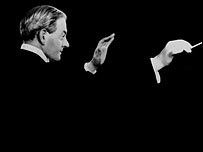
Sir Hamilton Harty (4 December 1879 – 19 February 1941) was an Irish and British composer, conductor and accompanist.
Harty was born in Hillsborough, Ireland, the fourth of ten children of church organist William Michael Harty (1852–1918) and his wife, Annie Elizabeth, the daughter of Joseph Hamilton Richards, a soldier from Bray. Raised an Anglican, Harty played viola, piano, and organ as a child. Initially following in his father's footsteps, he held positions as a church organist from age twelve. He moved to London in 1901 to pursue a musical career as accompanist, and accompanied an impressive list of soloists, among them John McCormack, W.H. Squire, Joseph Szigeti, Fritz Kreisler, and soprano Agnes Nicholls, whom he married on 15 July 1904.
Nicholls' professional relationship with the Hungarian conductor Hans Richter was of great importance to Harty. After performing in Wagner's Der Ring des Nibelungen under Richter in 1908, she approached him on her husband's behalf. It was through this connection that Harty secured his first important conducting engagement: a performance of his tone poem With the Wild Geese with the London Symphony Orchestra in March 1911. The performance was a success, and he was engaged to conduct the orchestra again during its 1912–13 season. Hoping to reinforce his status as a composer–conductor, Harty gave the first performance of his Variations on a Dublin Air with the same orchestra in February 1913. Unfortunately, neither the critics nor the public shared his enthusiasm for his music: his concerts made a loss and he was not invited back for the following season. Nevertheless, his reputation as a conductor continued to grow, and he was invited to perform Wagner's Tristan und Isolde and Bizet's Carmen at Covent Garden in 1913. But he had little sympathy with opera, preferring symphonic music instead. In January 1914 he conducted the Liverpool Philharmonic Orchestra, and in April he made his début with the Hallé Orchestra of Manchester. His career was interrupted briefly by the First World War: in June 1916 he joined the Royal Naval Volunteer Reserve and was posted for duties in the North Sea, and he rose to the rank of lieutenant in 1917 before leaving in June 1918. In December he substituted for an indisposed Sir Thomas Beecham at a performance of Handel's Messiah with the Hallé Orchestra, and on 27 March 1919 he again replaced Beecham at a performance of J. S. Bach's mass in B minor.
Harty did most of his composing between 1901 and 1920, including his An Irish Symphony, his tone poem With the Wild Geese, his Violin Concerto, and his setting of Ode to a Nightingale for soprano and orchestra, premiered by Nicholls.
After short stints with the London Symphony Orchestra and elsewhere in England, Harty became permanent conductor of The Hallé in 1920, a position that he held until 1933. Under his baton, the Hallé became one of the premier orchestras in England. He was knighted in 1925. From 1931 to 1936, Harty toured in America and elsewhere, conducting in Boston, Chicago, Cleveland, Los Angeles, San Francisco, and Rochester, as well as in Sydney, Australia.
Harty's health began to deteriorate sharply in 1936: a malignant brain tumour was discovered and surgery was required. After both the growth and his right eye were removed, Harty convalesced in Ireland and Jamaica during 1937 and 1938. Unable to conduct, he returned to composing: he set five Irish songs and wrote his last original composition, the tone poem The Children of Lir, during his convalescence. Following two studio concerts with the BBC Symphony Orchestra in December 1938 and February 1939, Harty returned to the Queen's Hall on 1 March 1939, directing the première of The Children of Lir with the BBC Symphony Orchestra. After another period of convalescence in the summer of 1939 he undertook a full programme of concerts during the 1939–40 season. But his illness continued to trouble him, and he conducted for the last time on 1 December 1940. Because of Harty's estrangement from his wife, the conductor was nursed through his final illness by his secretary and intimate friend, Olive Elfreda Baguley. Harty died in Hove; after cremation his ashes were placed in Hillsborough parish church.
G.F. Handel (arr. Harty) - "Water Music" Suite I. Allegro
II. Air
III. Bourree; Hornpipe
IV. Allegro deciso
Hallé Orchestra Rec.: 10-11.1922 H. Harty - Fantasy Scenes from an Eastern Romance I. The Laughing Juggler
II. A Dancer’s Reverie
III. Lonely in Moonlight
IV. In the Slave Market
Court Symphony Orchestra Rec.: 1918-19 (?) Hamilton Harty | 
